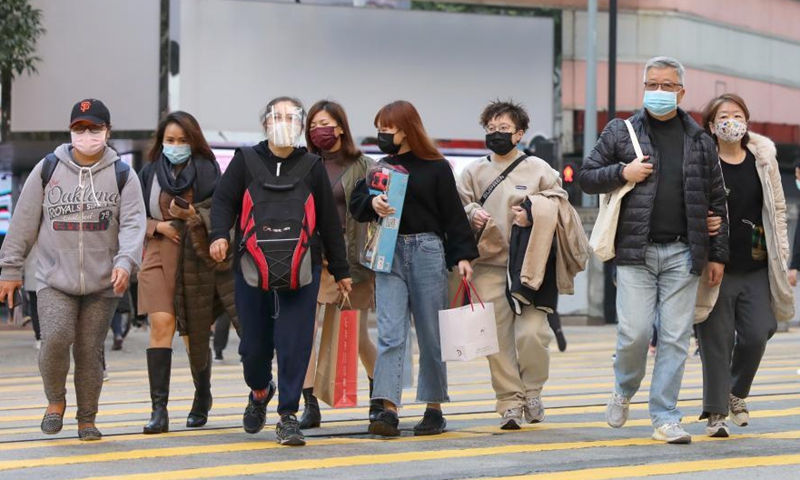
Pedestrians wearing face masks walk on a street in Hong Kong, south China, Dec. 20, 2020. (Xinhua/Wu Xiaochu)
Hong Kong is expected to be in the first batch of countries and regions in the world to get widespread COVID-19 vaccine coverage among its citizens by the end of 2021, the Economist Intelligence Unit (EIU) forecast recently, despite the relatively low public confidence in the vaccines, experts noted.
The EIU map released on Thursday for the rollout of coronavirus vaccines worldwide indicates when countries and regions can expect to have vaccinated the majority (60-70%) of their adult population. The US, the UK, Italy and Singapore are also among the first batch.
The Hong Kong government plans to start free vaccination among its citizens on a voluntary basis from February, and expects to cover most of its citizens by the end of this year, Chan Siu-chee, director of Hong Kong’s Food and Health Bureau announced on January 13.
It will be a difficult task for Hong Kong, but it is still expected to realize the goal, as the city has a small population and the government has purchased several kinds of COVID-19 vaccines that will be sufficient for widespread vaccination, Jin Dongyan, a biomedical professor at the University of Hong Kong, told the Global Times.
Hong Kong has purchased 22.5 million doses of COVID-19 vaccines from Sinovac, Fosun Pharma and BioNtec, as well as AstraZeneca – 7.5 million from each firm. The government will continue to look for a fourth vaccine source, HK Chief Executive Carrie Lam announced on December 23.
However, Hong Kong people’s confidence in the COVID-19 vaccines has seen a worrying drop. A recent survey conducted by the University of Hong Kong among 1,000 Hong Kong residents showed that only 45.9 percent residents wanted to take a COVID-19 vaccine, less than the average of 60 percent in polls done from June to November in 2020, local media reports said on Friday.
People’s attitude toward the three vaccines that the government has purchased also varies, based on the poll by Hong Kong University. About 55.9 percent said they would accept the one from Fosun Pharma and BioNTech, but 35.3 percent for the one by AstraZeneca Plc and Oxford University, and only 29.5 percent for the one by Sinovac.
Another survey released by the Faculty of Medicine of the Chinese University of Hong Kong on January 12 found that only 37 percent of adults are eager to receive a dose, far lower than in other regions and countries, where the rate is about 60-90 percent.
The survey was conducted among 1,200 respondents from July 27 to August 27, when the city was experiencing the third wave of COVID-19, the university said.
To realize herd immunity, it is widely recognized that the vaccination rate in a specific region needs to reach 70 to 90 percent. The Hong Kong government needs to improve education on COVID-19 vaccines among residents, in a bid to enhance people’s confidence in the vaccine, experts noted.
The COVID-19 vaccines now in use worldwide are generally safe, and the adverse effects are still in an acceptable range, Tao Lina, a Shanghai-based vaccine expert, told the Global Times.
“Worries about adverse effects could deter people from the vaccination, so the government needs to clarify the information and guide residents to have a more accurate understanding of vaccines,” Tao said.
Jin noted that people’s lack of trust in the government may also cause difficulties for the city’s vaccination campaign. “So it is very clear that we have to mobilize people to receive the vaccine,” Jin said, adding that protection could occur only when the vaccination rate improves.

